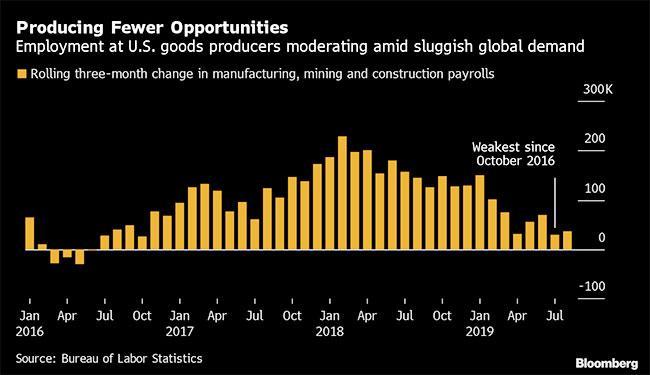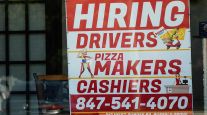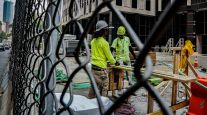Weak Jobs Outlook Echoes Disaster-Hit Months

[Stay on top of transportation news: Get TTNews in your inbox.]
The last time U.S. payroll forecasts were this low, hurricanes had slammed the country in 2017, temporarily closing businesses. Or go back to 2013 when there was a federal government shutdown.
But for the September jobs report due Oct. 4, Wall Street economists see a more persistent storm at play: the trade war and manufacturing recession. Those factors are starting to permeate the economy at a time when companies are already struggling with a shrinking pool of qualified workers.
The combination of forces has pushed down the median estimate for private payrolls to a gain of just 130,000 last month. That’s the weakest projection heading into a jobs report in seven years, outside of months affected by events such as major storms or the shutdown. Estimates for total nonfarm payrolls are higher, at 148,000, because of an expected boost from temporary census hiring.

A reading that’s even weaker than predicted would probably boost investor expectations that the Federal Reserve will cut interest rates Oct. 30 for a third straight meeting and potentially again in December, completing a reversal of all four hikes from 2018. It may also force Fed officials to rein in their assessment of the labor market, which they’ve labeled as “strong” in policy statements as recently as September.
For President Donald Trump, who has repeatedly pinned any economic weakness on the central bank, a sluggish labor market could pose a threat to his re-election in 2020. Currently the U.S. is on track to add about 1.9 million jobs this year, which would be the smallest gain since 2010 and down from 2.7 million in 2018.
U.S. stocks slumped 3% in the last two days amid dour economic data. On Oct. 2, the Institute for Supply Management said its factory index fell deeper into contraction in September with the worst reading in a decade, while the employment gauge hit a three-year low. Meanwhile, companies’ hiring was the slowest in three months, according to a report from private data provider ADP.
“It’s starting to roll into one big ball of negativity,” said Jennifer Lee, a senior economist at BMO Capital Markets in Toronto. “You just don’t have the supply of workers out there, but now it’s starting to become worse.”
Want more news? Listen to today's daily briefing:




